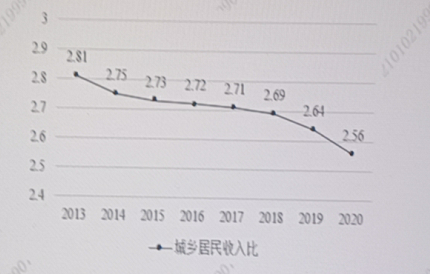2022-12-31 14:00:43 | 来源:网络及考生回忆
(多选)138、习近平总书记强调要系统总结我国量子科技发展的成功经验,借鉴国外的有益做法,抢占量子科技国际竞争制高点。以下有关量子科技的说法正确的有( )。
A、量子科技是量子力学与信息科学的交叉学科,它以量子力学原理为基础对信息进行处理,从而在计算、传输、测量等应用领域表现出较经典信息处理的巨大优势
B、量子科技应用领域包括量子通信、量子计算、量子测量、量子存储、量子定位等,其中,尤以量子通信和量子计算备受瞩目,成为全球竞争焦点
C、量子通信是基于量子纠缠效应实现信息传递的新型通信方式,包括量子保密通信、量子隐形传态、量子密集编码等方向
D、量子计算是将量子力学,即量子态的叠加性和纠缠性应用于计算领城,从而实现算力指数级提升的计算方式
(多选)139、目前物联网体系架构主要分为( )等层次。
A、数据层
B、感知层
C、网络层
D、应用层
(多选)140、城乡居民收入比(=城镇居民可支配收入/农村居民纯收入)是衡量城乡居民收入差距的一个重要指标,该指标可以直观地衡量城乡收入的相对差距。2020年我国城乡居民收入比为2.56。阅读下图,据此可以得出( )。

A、农村居民收入增速快于城镇居民
B、城镇居民收入呈下降趋势
C、城镇居民收入总数大于农村居民
D、城乡居民贫富差距正在逐步缩小
(多选)141、根据以下图表信息,下列说法正确的有( )。


A、东部县级党政领导班子成员年龄主要集中在46~50岁,西部主要集中在51~55岁
B、对东西部县级党政领导班子成员的年龄进行独立样本t检验,结果显示存在显著差异
C、相较于西部,东部县级党政领导班子成员年龄离散程度更大
D、在29~35岁这一年龄段,相较于东部,西部占比更高
(多选)142、以下属于中国建设银行宣传用语的有( )。
A、善建者行 成其久远
B、中国建设银行 建设美好生活
C、与客户同发展 与社会共繁荣
D、不断创新 追求卓越
(多选)143、近年来,中国建设银行以习近平总书记提出的增强“三个能力”建设重要指示为根本遵循,以实际行动诠释国有大行使命担当。“三个能力”是指( )。
A、参与国际竞争能力
B、服务国家建设能力
C、防范金融风险能力
D、维护金融市场稳定能力
(多选)144、以下有关中国建设银行企业文化理念描述正确的有( )。
A、人才理念:尊重人才 用好人才 留住人才
B、合规理念:全员主动合规 合规创造价值
C、服务理念:客户至上 注重细节
D、经营理念:以市场为导向 以客户为中心
(多选)145、2021年以来,中国建设银行纵深推进新金融实践,在服务“十四五”良好开局中抓住发展机遇,取得了良好的经营业绩。以下有关中国建设银行2021年度上半年经营情况的说法中,正确的有( )。
A、金融科技战略纵深发展,在计算机视觉、智能语音、自然语言处理、知识图谱、智能决策五大领域研发180个模型,累计获取专利授权606件,其中发明专利389件,发明专利授权数量国内银行业领先
B、住房租赁综合服务平台覆盖全国96%的地级及以上行政区,打造“CCB建融家园”长租社区,为园区蓝领、职场白领、青年创客等群体提供舒适的租住环境
C、截至6月末,资产负债规模实现稳定增长,资产负债结构持续优化,资产总额29.83万亿元,净利润1541.06亿元
D、助力人民币国际化战略,上半年,完成跨境人民币结算量1.28万亿元,其中英国人民币清算行累计清算量突破57万亿元,始终保持亚洲以外最大的人民币清算行地位
材料
Clouds gathered over Komazawa stadium in Tokyo as the Olympic torch arrived on July 9th. Because of the pandemic, the traditional public relay was replaced by a small ceremony behind the stadium's closed doors. Protesters outside held signs that read “Protect lives not the Olympics” and “Extinguish the Olympic torch”. As Kyogoku Noriko, a civil servant, put it, “Now is not the time for a festival,” More enthusiastic onlookers lined a nearby footbridge, hoping to catch a glimpse of the flame through the stadium's rafters, For Honma Taka, an office worker, the torch offered “a bit of light within the darkness”
Mr Honma longingly recalled a brighter day in the same park eight years earlier, when he joined thousands of others to celebrate as Tokyo won the right to host the games. Abe Shinzo, Japan's prime minister at the time, said he was happier than he had been when he became prime minister. Mr Abe saw the Olympics as a chance to lend credence to his bullish catchphrase: “ Japan is back”. He hoped the games would help the country snap out of its gloom after decades of economic stagnation, demographic decline and devastating natural disasters. The games, says Taniguchi Tomohiko, a special adviser to Mr Abe, were seen as a source of “a commodity that was in scarce supply: hope for the future”.
The grand designs had a powerful precedent in the previous Tokyo Olympics, in 1964. Just two decades after defeat in the second world war, those games came to encapsulate both Japan's rise from the ashes and its re-entry into the global community. Tokyo, which had been reduced to cinders by American firebombing, was smartened up. New roads and rail lines, including the first shinkansen, or bullet train, were built. “ There was a feeling in the 1960s that everyday life was becoming richer. today is better than yesterday, and tomorrow will be better than today- -and the Olympics became a symbol of this,” says Togo Kazuhiko, a former ambassador who was a student at the time. The excitement left lasting impression on a generation, including Mr Abe, who invoked his childhood memories of 1964 when Tokyo won the bid for this year's games.
If not for the pandemic excitement may well have materialised again. The current Tokyo Olympics has had its share of cntroversies, from an over- budget stadium to rank sexism from the (now departed) head of the organising committee. Nor would a sporting event alone be enough to resolve Japan's problems. But the games were shaping up to be a source of pride. Tens of thousands of young Japanese had signed up to volunteer. Japan planned to welcome 40m foreigners in 2020,when the games were originally scheduled. Tourists would have found an impeccably clean, safe, well-run metropolis. Akita Hiroyuki a commentator for Nikkei, a Japanese daily reckons that the Olympics could have been a “white ship” that catalysed the country to “ wake up and open up”.(The Americans who forced Japan to open to the world in the 19th century arrived in “ Black Ships”.)
2025-07-15
2025-06-06
2025-06-06
2025-05-20
2025-05-20
2025-05-20
2025-05-17
2025-05-16
2025-05-16
2025-05-15